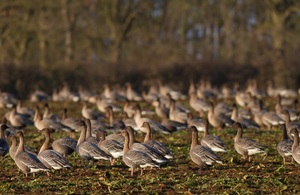Landmark extension for one of Britain’s most important sites for water birds
Ribble Estuary National Nature Reserve (NNR) extended to give greater protection to more than a quarter of a million migrating water birds.

Pink-footed geese. Credit: Natural England.
Natural England has today [9 December] confirmed that one of the most important sites in Britain for water birds - the Ribble Estuary National Nature Reserve (NNR) in Lancashire - has been extended by nearly a fifth.
The additional areas of internationally important saltmarsh and newly created wetland habitats now added to the NNR, bolstering the nature reserve’s impressive stature as the third largest in England at 5,231 hectares.
The NNR is one of Britain’s most important sites for water birds, with many rare and threatened species breeding or wintering there each year. Over a quarter of a million migrating water birds gather on the marshes each winter, including the iconic sight and sound of tens of thousands of pink-footed geese that migrate to the estuary from Greenland and Iceland during the autumn. The Ribble Estuary is also an important site for declining birds including lapwings, ringed plovers, sanderling, and redshanks, as well as being one of the UK’s strongholds for water voles.
Today’s declaration is a result of a partnership of many landowners and stakeholders across the estuary – including Natural England, The RSPB, and LDWA – who have collaborated to secure greater protection and management for the Ribble Estuary’s rich habitats.
Announcing the new extension, Natural England Chair Tony Juniper, said:
The National Nature Reserves are the very jewels in the crown of our wonderful natural environment and Natural England is very proud to declare this very significant extension to what is already one of our largest of such reserves. The Ribble Estuary is one of the UK’s most important areas for water birds and this extension will mean that the habitat here will be bigger, better, and more joined-up, making for a more secure future for the iconic wildlife that relies on this internationally-important place, including the quarter of a million migrating water birds who visit and feed here.
For far too long the natural world upon which we all depend has been in decline, and today marks another important step toward the establishment for England’s Nature Recovery Network, enabling the restoration of Nature at scale across the length and breadth of the country, in the process bringing a wide range of practical benefits, including for everyone to enjoy.
Jim Wardill, RSPB Operations Director for Northern England, said:
The fantastic news of a bigger, better and more joined up National Nature Reserve, is real testament to both the national importance of the estuary’s birdlife, and the power of collaborations. We’re excited about what this large scale nature reserve means for both the wildlife that can thrive there, and the local communities who will be able connect to nature and learn about the importance of conservation through the RSPB’s newly refurbished Ribble Discovery Centre from next spring.
Andrew Cash, Chairman of Lytham and District Wildfowlers Association (LDWA), said:
LDWA are proud to have been custodians for more than 35 years of 200 plus hectares on the north bank of the Estuary, the last 25 of these within the Ribble Estuary National Nature Reserve. Working in close conjunction with Natural England and its predecessors, the area has become increasingly a haven for breeding and overwintering birds, and other fauna and flora, and a nationally recognised model of good saltmarsh management and conservation.
LDWA are pleased, as part of the extension of the Nature Reserve announced today, to have dedicated a further 100 plus hectares of its land, to ensure the future protection and improvement of the Association’s landholdings under the agreed management regime for the enlarged area.
Additional information
- The existing NNR will be expanded to include the RSPB Marshside and RSPB Hesketh Out Marsh nature reserves, as well as additional land managed by the Lytham and District Wildfowlers Association (LDWA) at Warton Marsh. Natural England will continue to manage the substantial part of the existing NNR.
- The Ribble Estuary National Nature Reserve was first declared in 1981 (as Ribble Marshes NNR), originally over an area of 2302 hectares, and has since been extended on three occasions. The previous extent of the NNR covered an area of 4365 hectares, which has now extended to 5231ha. The estuary is also designated a Site of Special Scientific Interest (SSSI), a European Special Protection Area (SPA), and international Ramsar site.
- All in all the Ribble caters for 12 species at numbers of International importance (i.e. it has more than 1% of their entire population) and an additional 13 species at levels of national importance (i.e. it is home to more than 1% of their UK population).